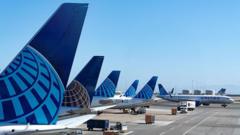Are Delta and United Misleading Passengers with Window Seats That Lack Windows?

The recent lawsuits against Delta Air Lines and United Airlines highlight a significant issue concerning seat selection transparency. Passengers claim they were charged extra for window seats, only to discover their seats were next to a blank wall. The lawsuits, filed by legal firm Greenbaum Olbrantz, seek millions in damages for over a million customers affected by this alleged practice, which they argue is misleading and potentially unlawful.
Last updated: 24 October 2023 (BST)
Overview of the Lawsuits
The lawsuits filed against Delta and United Airlines are similar in nature and content, focusing on the allegation that the airlines fail to adequately inform passengers that certain "window seats" do not actually have windows. This practice of charging premium prices for seats without windows has raised concerns about consumer rights and transparency in the airline industry.
Key Takeaways
- Passengers have sued Delta and United Airlines for charging extra for window seats that lack windows.
- The lawsuits seek millions in damages for over a million affected customers.
- Both airlines allegedly fail to disclose the windowless status of certain seats during the booking process.
- The complaints describe this practice as "deceptive" and "unlawful."
- Other airlines disclose windowless seats during the booking process.
The Nature of the Claims
The core of the dispute lies in the definition of a "window seat." According to the complaints, both Delta and United define seats located along the aircraft's side as window seats, regardless of whether they are positioned next to a window. This has led to confusion and dissatisfaction among passengers who expect a view or additional comfort associated with such seating options.
Many passengers choose window seats for specific reasons, including:
- Addressing fear of flying
- Mitigating motion sickness
- Keeping children entertained
- Enjoying the view during the flight
The lawsuits assert that had passengers been informed about the absence of windows at the time of booking, they might not have chosen those seats, or would have opted for standard seats instead.
Details of the Allegations
The legal complaints outline various scenarios where passengers have been allocated windowless seats due to the positioning of essential components like air conditioning ducts and wiring. These seats are not flagged by the airlines during the booking process, leading to claims of consumer deception.
According to the court documents, some passengers have reported feeling misled after paying a premium for their tickets, only to be seated next to a blank wall. The legal representation for the plaintiffs argues that this practice is misleading and violates consumer protection laws.
Comparison with Other Airlines
Interestingly, the lawsuits point out that other airlines, such as American Airlines and Alaska Airlines, have a different approach. These carriers reportedly disclose the absence of windows for certain seats during the booking process, providing passengers with clearer information before making their purchase. This transparency raises questions about the practices of Delta and United Airlines, as they continue to describe every seat along the sides as a "window seat."
Legal and Financial Implications
The financial stakes in these lawsuits are considerable, with claims seeking millions in damages on behalf of potentially over a million affected customers for each airline. The legal proceedings have the potential to set a precedent in the airline industry regarding seat classification and the responsibilities of carriers to provide transparent information to consumers.
Legal experts suggest that if the plaintiffs succeed, it could prompt significant changes in how airlines disclose seat information, potentially leading to a more consumer-friendly booking process.
What Happens Next?
As these lawsuits progress, the airlines will likely need to prepare their defence, which may involve presenting evidence about their seat classification practices and the rationale behind them. Both Delta and United Airlines have not publicly commented on these specific allegations, with United stating that it is an ongoing legal matter, while Delta has been approached for comment.
In the meantime, passengers affected by this situation may want to stay informed about the developments of these lawsuits and consider their options regarding refunds for the extra fees charged for window seats.
Consumer Rights and Airline Transparency
This situation raises important questions about consumer rights and the need for transparency in the airline industry. Passengers have a right to know what they are paying for, and misleading practices can lead to a loss of trust in airlines. The outcome of these lawsuits may encourage further discussion about the need for clearer communication in the booking process.
What Can Consumers Do?
For passengers who feel they may have been affected by this issue, here are some steps to consider:
- Review your seat selection and booking details.
- Contact the airline for clarification on seating classifications.
- Document any correspondence or evidence regarding your seat assignment.
- Stay informed about the lawsuits and consider joining any collective actions if applicable.
Conclusion
The lawsuits against Delta Air Lines and United Airlines serve as a reminder of the importance of transparency in air travel. The implications of these legal actions could extend beyond monetary damages, potentially leading to a shift in how airlines communicate with their customers about seat selections. As the industry continues to evolve, passengers deserve clarity and fairness in their travel experiences.
Will this legal battle prompt airlines to rethink their booking practices? Only time will tell. #AirlineTransparency #ConsumerRights #WindowSeatDebate
FAQs
Why are Delta and United Airlines being sued?
Passengers have sued these airlines for charging extra for window seats that do not actually have windows. The lawsuits claim this practice is misleading and unlawful.
What do the lawsuits seek?
The lawsuits aim to recover millions in damages for over a million customers affected by the alleged deceptive practices related to window seat bookings.
What are the reasons passengers choose window seats?
Passengers typically select window seats to address fear of flying, mitigate motion sickness, keep children entertained, or enjoy scenic views during flights.
How do other airlines handle windowless seats?
Unlike Delta and United, airlines like American Airlines and Alaska Airlines disclose during booking if a seat does not include a window, ensuring passengers are informed before purchasing.
What should affected passengers do?
Affected passengers should review their booking details, contact the airline for clarification, document any evidence, and stay informed about the ongoing lawsuits and potential collective actions.
Published: 2025-08-21 03:00:52 | Category: technology



